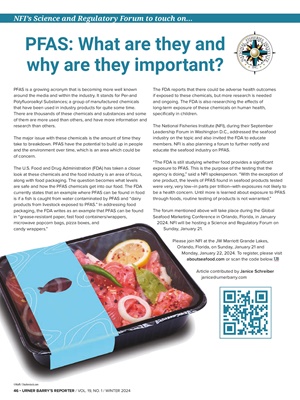
46 • URNER BARRY'S REPORTER / VOL. 19, NO. 1 / WINTER 2024
NFI's Science and Regulatory Forum to touch on…
PFAS: What are they and
why are they important?
PFAS is a growing acronym that is becoming more well known
around the media and within the industry. It stands for Per-and
Polyfluoroalkyl Substances; a group of manufactured chemicals
that have been used in industry products for quite some time.
There are thousands of these chemicals and substances and some
of them are more used than others, and have more information and
research than others.
The major issue with these chemicals is the amount of time they
take to breakdown. PFAS have the potential to build up in people
and the environment over time, which is an area which could be
of concern.
The U.S. Food and Drug Administration (FDA) has taken a closer
look at these chemicals and the food industry is an area of focus,
along with food packaging. The question becomes what levels
are safe and how the PFAS chemicals get into our food. The FDA
currently states that an example where PFAS can be found in food
is if a fish is caught from water contaminated by PFAS and "dairy
products from livestock exposed to PFAS." In addressing food
packaging, the FDA writes as an example that PFAS can be found
in "grease-resistant paper, fast food containers/wrappers,
microwave popcorn bags, pizza boxes, and
candy wrappers."
The FDA reports that there could be adverse health outcomes
if exposed to these chemicals, but more research is needed
and ongoing. The FDA is also researching the effects of
long-term exposure of these chemicals on human health,
specifically in children.
The National Fisheries Institute (NFI), during their September
Leadership Forum in Washington D.C., addressed the seafood
industry on the topic and also invited the FDA to educate
members. NFI is also planning a forum to further notify and
educate the seafood industry on PFAS.
"The FDA is still studying whether food provides a significant
exposure to PFAS. This is the purpose of the testing that the
agency is doing," said a NFI spokesperson. "With the exception of
one product, the levels of PFAS found in seafood products tested
were very, very low-in parts per trillion-with exposures not likely to
be a health concern. Until more is learned about exposure to PFAS
through foods, routine testing of products is not warranted."
The forum mentioned above will take place during the Global
Seafood Marketing Conference in Orlando, Florida, in January
2024. NFI will be hosting a Science and Regulatory Forum on
Sunday, January 21.
Please join NFI at the JW Marriott Grande Lakes,
Orlando, Florida, on Sunday, January 21 and
Monday, January 22, 2024. To register, please visit
aboutseafood.com or scan the code below.
Article contributed by Janice Schreiber
janice@urnerbarry.com
©Maffi / Shutterstock.com